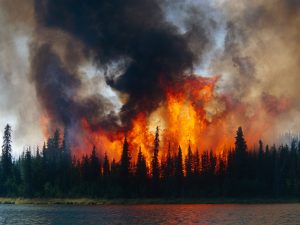The Arctic is Burning
When you think of the Arctic, fire is probably not the first thing that comes to mind, but from 2002-2013, an average of 250,000km2 of Arctic land have burned annually.

Arctic wildfires are a unique and complicated problem. Fires often occur rapidly and in areas that are not easily accessed by humans, preventing most firefighting tactics from having any effect. Most fires are detected through satellite imaging and remote sensing. While in the past, fires have served as the only disturbance event in the Arctic, restoring nutrients from the boreal forests to the soil and enriching the landscape, today more than just the boreal forest is burning.
Temperatures in the Arctic do not allow organic matter to decompose, instead freezing dead plants and animals in permafrost. The tundra becomes one of the largest carbon sinks on earth, preventing organic material from releasing carbon into the atmosphere. As temperatures rise as a result of global climate change, Arctic permafrost has begun to thaw, creating boggy peatlands instead. These peatlands have begun releasing millions of tons of stored carbon gasses the Arctic, accelerating the processes of global warming.

The gases released from these peatlands—primarily carbon dioxide and methane—are also highly flammable. Arctic wildfires no longer burn just the forests and grasslands, but have begun burning the tundra itself, further hastening the release of this stored carbon. These fires can also burn below the surface, creating “zombie fires” that smolder under the surface during the winter, emerging again in the spring after the snow melts. Since peatland fires smolder, they burn at temperatures that are too low to be detected by most remote sensing methods.
Black carbon released from these fires also settles on the polar ice cap, decreasing the Albedo effect and increasing Arctic warming even more.
Current Policy

The Circumpolar Wildland Fire Project is administer through the Emergency Prevention, Preparedness, and Response working group of the Arctic Council. The project focuses on improving the coordinated response to wildfires across international borders, as well as improving trainings for Arctic firefighters in all Arctic nations. The Gwich’in Council International (GCI) have led the project, also working to incorporate indigenous fire management practices with Western science to develop the most effective Wildland Fire response.
While this policy has been a valuable effort for boosting Wildland Fire response, it is reactive and does not provide any additional funding to address these problems.
Policy Proposals
1. Commitment to Research
Firefighting efforts are only as effective as their background knowledge of the dynamics of the landscape around them. With the Arctic environment changing rapidly, Arctic nations must commit more funding towards the research and understanding of peatland wildfires. This includes an understanding of peatland depth and models to predict permafrost melting.
2. Spread the Word
On a global level, the vicious cycle of Arctic wildfires and images of the tundra burning need to be incorporated into the global climate change conversation. These fires are alarming and demonstrate the urgency of global climate agreements to halt carbon emissions. Arctic wildfires make a strong case that greenhouse gas emissions affect the entire planet.
The cycle of warming is getting out of control, and these fires will only grow as a threat to communities in the Arctic and the health of ecosystems around the globe. Further action must be taken from the international community to slow the release of anthropogenic carbon to halt the warming of the Arctic and subsequent Arctic wildfires.
[ensemblevideo version=”5.6.0″ content_type=”video” id=”d6dee9b9-b07a-4450-84b5-c7d179bc2572″ width=”848″ height=”480″ displaytitle=”true” autoplay=”false” showcaptions=”false” hidecontrols=”true” displaysharing=”false” displaycaptionsearch=”true” displayattachments=”true” audiopreviewimage=”true” isaudio=”false” displaylinks=”true” displaymetadata=”false” displaydateproduced=”true” displayembedcode=”false” displaydownloadicon=”false” displayviewersreport=”false” embedasthumbnail=”false” displayaxdxs=”false” embedtype=”responsive” forceembedtype=”false” name=”Jack Burnett Arctic Peatland Wildfires”]